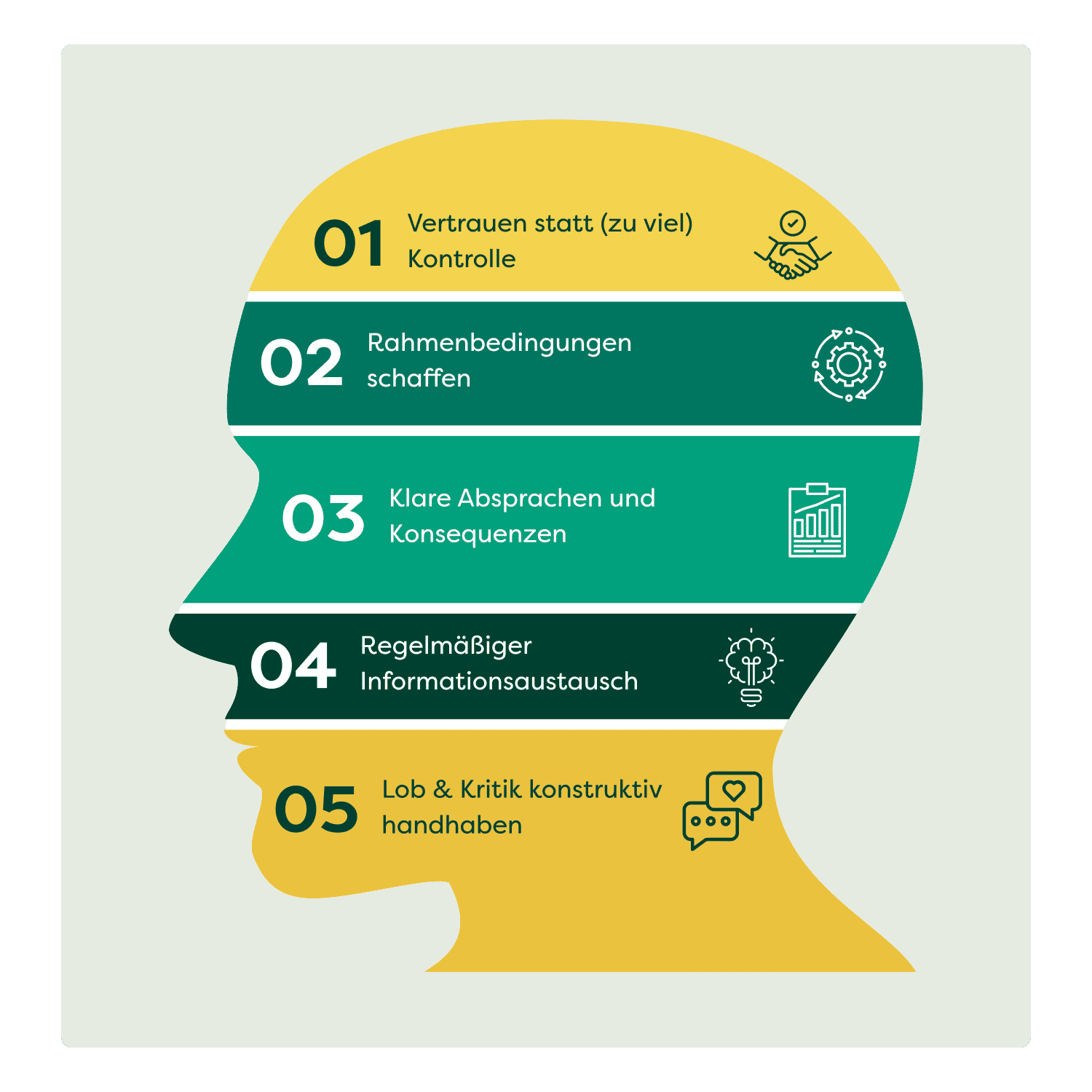
Die steigende Nachfrage nach Flexibilität, Schnelligkeit und Agilität am Arbeitsplatz stellt Unternehmen vor neue Anforderungen. Dies führt dazu, dass Mitarbeitende verstärkt Verantwortung übernehmen und in Entscheidungsprozesse eingebunden werden. Die räumliche Trennung durch mobiles Arbeiten bringt zusätzliche Herausforderungen mit sich. Um wettbewerbsfähig zu bleiben, müssen Sie nicht nur bestehende Führungskonzepte und Arbeitsmodelle überdenken, sondern auch optimieren. In diesem Blogartikel stellen wir Ihnen die fünf wichtigsten Kernkompetenzen vor, die Sie als digitale Führungskraft benötigen und mit welchen Methoden Sie die Arbeitsorganisation und Einstellung Ihres Teams transformieren können.
Digital Leadership repräsentiert einen innovativen Führungsansatz, der geschickt die Dimensionen der Digitalisierung und des modernen Führungsstils integriert. Dieser ganzheitliche Ansatz zeichnet sich durch die optimale Nutzung der Potenziale der Digitalisierung aus und steht für die Einführung von innovativen Strukturen.

Im Zentrum dieses Führungsstils liegt die individuelle Entwicklung Ihrer Teammitglieder. Unterstützen Sie Ihre Belegschaft in ihren Fähigkeiten, Zielen und Handlungsspielräumen. Denn: Im Digital Leadership gehen Sie über Ihre herkömmliche Rolle als Führungskraft hinaus! Sie agieren vielmehr als Trainer und Coach für Ihr Team. Denn: Die Modernität dieses Führungsstils zeigt sich auch in der Betonung der Teamarbeit. Somit ermöglichen Sie nicht nur die Teilhabe, sondern fördern aktiv die Mitwirkung Ihrer Angestellten. Hierbei ist es von entscheidender Bedeutung, Ihrem Team Raum zu geben und Wertschätzung zu zeigen, was wiederum die Kreativität und individuelle Weiterentwicklung begünstigt.
Dabei sollten Sie Ihre Rolle als Digital Leader nicht nur theoretisch ansehen, sondern auch in der Praxis umsetzen. Wie das? Überdenken Sie Unternehmensstrukturen und entwickeln Sie gemeinsam mit Ihrem Team zeitgemäße Arbeitsweisen. Als Digital Leader nehmen Sie maßgeblich Einfluss auf den Erfolg oder Misserfolg von Transformationsprozessen in Ihrem Unternehmen. Und: Ein integrales Element des Digital Leadership ist die Freiheit Fehler zu machen und darüber zu sprechen, ohne Sanktionen zu befürchten. Ein angenehmes Arbeitsklima, das auf Innovationen, neuen Ansätzen und intrinsischer Motivation basiert, wird durch Ihre Vorbildfunktion geschaffen. Begeistern Sie Ihr Team für Veränderungen!
Als Digital Leader sind Sie viel mehr als nur Führungskraft. Sie nehmen Rollen mit vielfältigen Funktionen ein, um Ihr Team erfolgreich durch die komplexen Weiten der digitalen Transformationsprozesse zu führen. Somit sind Sie nicht nur Impulsgeber für Innovationen, sondern auch Change Manager, Brückenbauer und Navigator in einer sich dynamisch wandelnden Unternehmenslandschaft.
Jede Funktion oder Rolle dient dabei einem bestimmten Zweck, sei es die Delegation von Verantwortlichkeiten, die Förderung der Offenheit gegenüber der Digitalisierung, das Anstoßen von Innovationen oder die geschickte Navigation durch Veränderungen. Als Digital Leader werden Sie zu einem vielseitigen Akteur, der nicht nur die Gegenwart, sondern auch die Zukunft des Unternehmens, gemeinsam mit seinem Team, aktiv mitgestaltet. Auf folgende Rollen können Sie sich als Digital Leader einstellen:
⇒ Leader: Delegate responsibilities
⇒ Fachkraft: Möglichkeiten der Digitalisierung anwenden
⇒ Impulsgeber: Driving innovation forward
⇒ Change Manager: Proaktiv auf Veränderungen reagieren
⇒ Brückenbauer: Team über digitale Möglichkeiten aufklären
⇒ Navigator: Coordinate tasks, set goals, plan resources
Mit dem wachsenden Bedarf an Flexibilität und Agilität in der heutigen Arbeitswelt betreten Sie als Führungskraft eine Ära, die von schnellen Veränderungen und neuen Herausforderungen geprägt ist. Doch welche Kompetenzen müssen Sie erfüllen, um ein moderner Digital Leader zu sein, der sein Team motivieren und mitreißen kann? Die fünf Kernkompetenzen, die Sie im Digital Leadership erfüllen sollten, stellen den Dreh- und Angelpunkt dar, um in dieser sich wandelnden Landschaft erfolgreich zu sein.

Let's take a closer look at the individual points:
Setzen Sie auf Vertrauen als treibende Kraft und gehen Sie davon aus, dass Ihr Team auch ohne physische Präsenz effektiv arbeiten kann. Hierbei liegt der Fokus auf alternativen Leistungskriterien, die über die Anwesenheitszeiten hinausgehen. Als Leistungskriterien können Sie hier beispielsweise Kundenfeedback, Projektergebnisse und die Arbeitsqualität Ihres Teams beurteilen. Dabei sollten Sie stets in der Lage sein, flexibel zu agieren. Die Scheu vor Fehlentscheidungen, das Festhalten an überholten Strukturen und eine träge Reaktion auf Veränderungen hindern Ihr Unternehmer an einer reibungslosen digitalen Transformation. Als Digital Leader denken Sie disruptiv, insbesondere hinsichtlich neuer Arbeitsprozesse und Geschäftsmodelle.
Die Schaffung klarer Rahmenbedingungen ist entscheidend, insbesondere im Kontext von Remote-Work. Die Festlegung von Arbeitszeiten und Erholungsphasen ist nicht nur eine Orientierungshilfe für Ihr Team, sondern auch gesetzlich verankert. Achten Sie darauf, dass Ihre Mitarbeiter die Comply with regulations on working hours and break times. Eine entsprechende Software wie ZEP unterstützt Sie nicht nur dabei, sondern auch bei der Time recording obligation according to BAG judgement. Denn: Als Digital Leader sind Sie stets auf dem neuen Stand bezüglich Neuerungen und Veränderungen in der (digitalen) Arbeitswelt. Kontinuierliche Weiterbildungen und die Vermittlung dieses Wissens an Ihr Team sind entscheidend.
Die dritte Kompetenz für modernes Digital Leadership hebt die Wichtigkeit von klaren Absprachen und Konsequenzen hervor. Wie wird Fortschritt in Ihrem Unternehmen gemessen? Was gehört zu Ihrem Projektrahmen und was nicht? Durch klare Kommunikationsregeln und transparente Projektdefinitionen entsteht eine Struktur, die Unsicherheiten bei Ihrem Team minimiert und die Effizienz steigert. Eine Software für Projektzeiterfassung with a corresponding Planning of project times and Resources kann Ihnen hier die benötigte Unterstützung geben. Vergessen Sie nicht: Digital Leadership basiert auf Teamarbeit!
Gerade für Remote-Teams mit digitalen Führungskräften sind regelmäßiger Informationsaustausch und die Förderung von Interaktion von entscheidender Bedeutung. Die Herausforderung besteht für Sie nicht nur in formellen Meetings, sondern auch in der Schaffung von Raum für informelle Gespräche. Denn gerade diese halten Teams in der virtuellen Welt zusammen. Denken Sie daran: Sie als Digital Leader führen den digitalen Transformationsprozess im Unternehmen an. Ihre hundertprozentige Überzeugung und der Wille zur Veränderung sind dabei unerlässlich. Digital Leadership zeichnet sich nicht durch traditionelle Hierarchien aus, sondern fördert Freiraum für Ihr Team, um selbstbestimmt alle Fähigkeiten einzubringen. Voraussetzung dafür ist ein offener Informationsaustausch.
Im Digital Leadership geht es vor allem auch darum, eine Unternehmenskultur zu etablieren, in der Fehler nicht als Schwäche angesehen werden. Stattdessen wird eine positive Fehlerkultur gefördert, bei der Fehler als Chancen betrachtet werden, um daraus zu lernen. Als Digital Leader gehen Sie offen mit Ihren eigenen Fehlern um, fungieren als Vorbild für Ihr Team und schaffen eine Umgebung, in der neue Ideen sachlich diskutiert werden können. Think of your team as an agile Motor für Ihren Projekterfolg, denn nur als solches können Sie auf Veränderungen reagieren und angemessen handeln. Dienen Sie dabei als Vorbild für Ihr Team, indem Sie eine klare Vision, Verantwortungsbewusstsein, Empathie und Wertschätzung aktiv im Geschäftsalltag leben. Bleiben Sie auf Augenhöhe mit Ihrem Team. Das schafft das nötige Vertrauen für eine Arbeitswelt, in der eine Null-Fehler-Toleranz nicht mehr zeitgemäß ist!
In the context of digital leadership, it is above all the Fürsorgepflicht für Ihre Belegschaft an noch größerer Bedeutung – im Vergleich zur „Offline“-Führung. Dies liegt daran, dass viele Personen dazu neigen, im Homeoffice übermäßig viel zu arbeiten, da Laptop und E-Mails stets griffbereit sind. Die zunehmende Verschmelzung von Beruf und Privatleben führt dazu, dass nicht jeder sofort die nötige Selbstorganisation zum „Abschalten“ aufbringen kann, weshalb es sinnvoll sein kann, Privates & Berufliches räumlich voneinander zu trennen (z.B. mit einem eigenen Arbeitsraum). In dieser Situation kommt Ihre Rolle als Führungskraft besonders zum Tragen. In Remote-Teams ist es noch entscheidender, regelmäßig konstruktive Feedbackrunden einzuberufen, damit sich alle Teammitglieder verstanden, gehört und eingebunden fühlen. Durch Feedback ermöglichen Sie es Ihrem Team, sich trotz der physischen Distanz als integralen Bestandteil des Unternehmens zu fühlen, was die Zusammenarbeit fördert.
Der Schlüssel zum erfolgreichen Digital Leadership liegt also in einer soliden Vertrauensbasis und einer klaren Zielsetzung für jede Aufgabe. Strukturierte Organisation der Kommunikation ist dabei entscheidend, insbesondere wenn Sie als Führungskraft nicht mit Ihren Mitarbeitern physisch am selben Ort sind.
Die steigende Nachfrage nach Flexibilität und Agilität erfordert von Ihrem Unternehmen nicht nur ein Umdenken, sondern eine komplette Transformation Ihrer Führungsansätze und Arbeitsmodelle. Daher betrachten wir Digital Leadership auch als ganzheitlichen Ansatz, der die Potenziale der Digitalisierung optimal nutzt und innovative Strukturen einführt. Als Digital Leader übernehmen Sie dabei mehr als nur die herkömmliche Führungsfunktion – Sie werden zum Coach und Impulsgeber für Ihr Team!
Die Kernkompetenzen für erfolgreiche digitale Führung werden in den Bereichen Vertrauen, klare Absprachen, Informationsaustausch und konstruktive Kommunikation identifiziert. Vertrauen in die Fähigkeiten Ihres Teams, klare Rahmenbedingungen für Remote-Work inkl. Einhaltung gesetzlicher Arbeitsschutzmaßnahmen, transparente Kommunikation, regelmäßiger Informationsaustausch auf Augenhöhe und die Förderung einer positiven Fehlerkultur sind dabei die zentralen Bestandteile. Unser Co-CEO Benny Hahn unterstreicht als Digital Leader auch die Notwendigkeit einer effizienten Projektzeiterfassung, um nicht nach Anwesenheit, sondern nach Produktivität zu managen.

Nutzen Sie die Chance, Ihre Führungskompetenzen zu transformieren. Erfahren Sie, wie Digital Leadership Ihr Team voranbringen kann und starten Sie jetzt unsere 30-tägige Testversion, denn: Auf eine wertorientierte Führung und die aktive Förderung Ihres Teams werden Sie in Zukunft kaum verzichten können, wenn Sie die digitale Transformation erfolgreich meistern wollen.


Read article ↗

How can you strengthen your employer brand and attract the best talent? Discover 11 effective employer branding measures that will help you stand out from the competition and optimise your recruitment strategy.
Read article ↗
We answer your questions quickly & competently. Contact us by phone or email.
+49 7156 43623-0 or contact form